Is Gatorade Good For You? We Asked a Nutritionist
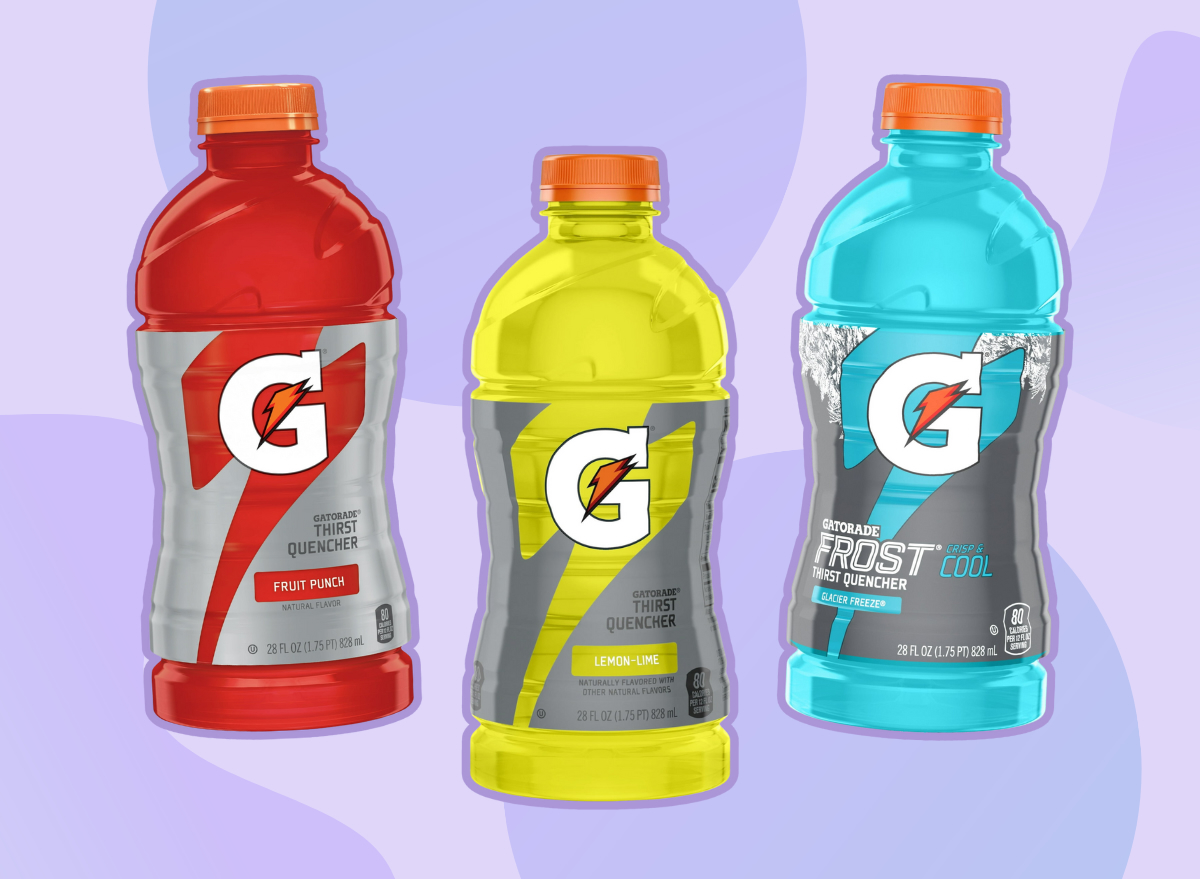
When you're low on electrolytes—whether from an intense workout, illness, or general dehydration—Gatorade is likely one of the first drinks that comes to mind. Since its creation at the University of Florida in 1965, this popular beverage has become synonymous with electrolyte replenishment. In fact, Gatorade sold nearly 1.2 million bottles in 2021 alone, proving its undeniable popularity.
But is Gatorade good for you? While its nearly two dozen beverages contain electrolytes, including sodium and small amounts of potassium, it's worth looking beyond the advertising to understand whether this neon-colored colored drink actually benefits your health.
As a nutritionist, I'm taking stock of whether Gatorade really aids your health. Read on to discover if Gatorade is good for you, and for more, don't miss Every Single Gatorade Flavor, Tasted & Ranked.
What Ingredients Are In Gatorade?
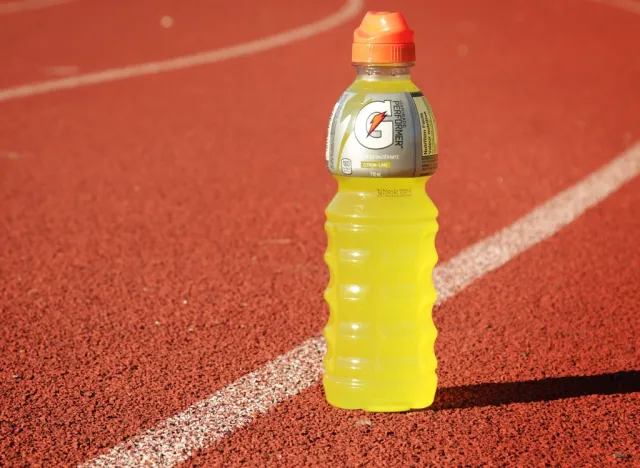
With multiple formulas and formats, Gatorade offers a range of products, each with a different ingredient profile. However, the one most people are familiar with is the original Thirst Quencher. This iconic drink begins with a base of water and two key sweeteners—sugar and dextrose—followed by additional ingredients that provide color, flavor, and electrolytes. These include:
- Citric Acid
- Salt
- Sodium Citrate
- Monopotassium Phosphate
- Gum Arabic
- Glycerol Ester Of Rosin
- Natural Flavor
- Yellow 5
If some of these components give you pause, you may be onto something. "Natural flavor," for example, is a catch-all term for anything derived from plants or animals. The FDA doesn't require brands to disclose what goes into their "natural" flavors—so it's unclear what's in the ones in Gatorade.
Glycerol ester of rosin, on the other hand, is made of refined wood rosin—a fact that doesn't exactly add to its appeal. Though considered food-safe by the Food and Drug Administration, it may only be used in foods under certain conditions (such as not exceeding 100 parts per million). Finally, yellow 5 is another potential red flag. Some research has linked this food dye to behavioral issues in children.
Nutritional Profile of Gatorade
Here's what you can expect in a 12-ounce bottle of Gatorade's Lemon-Lime Thirst Quencher:
Calories: 190
Fat: 0 g (Saturated fat: 0 g)
Sodium: 380 mg (17% DV)
Carbs: 51 g (Fiber: 0 g, Sugar: 48 g, Added Sugar: 48 g)
Protein: 0 g
Health Benefits of Gatorade
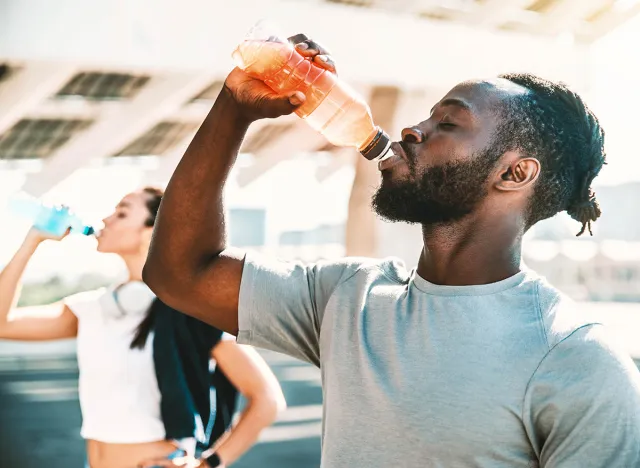
Replenishes Sodium Losses
When you lose copious fluids through sweat (or even GI issues like vomiting and diarrhea), you don't just deplete your body's water. You also lose minerals, including sodium. Low sodium in your blood can give you some unpleasant side effects like fatigue, poor muscle contraction, confusion, nausea, or headache. Gatorade's 380 milligrams of sodium per bottle can keep you from dipping too low.
Offers Hydration
If you're among the 17-28% of older adults in the U.S. who are chronically dehydrated, Gatorade might help replenish your fluid levels. Then again, so can other beverages like juice, tea, or plain old water. Still, if you enjoy the taste of Gatorade, it might get you to drink up more than you'd do with beverages you don't like.
Gives a Quick Energy Boost
Carbohydrates are the body's preferred source of energy, and with 51 grams of carbs (48 of which come from sugar), Gatorade offers a quick energy boost. If you're an endurance athlete, carbs can keep you going during an athletic event like a long run or cycle. They're are also an important component in workout recovery.
Potential Drawbacks of Gatorade
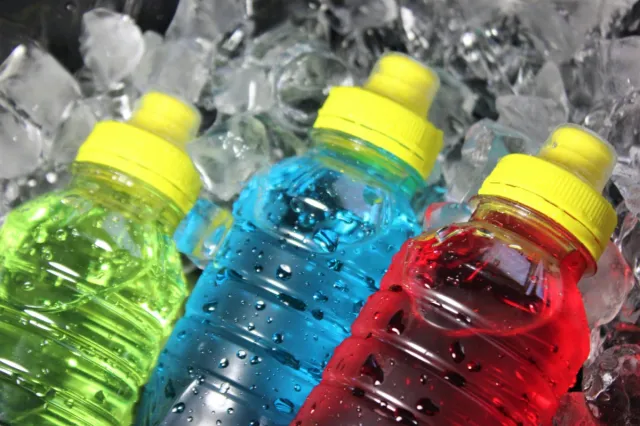
Adds Empty Calories
There's no getting around it: Gatorade is a high-calorie beverage. A 12-ounce bottle provides 190 calories. Research shows that calories we drink are not as satiating as those we eat. All those "empty" liquid calories could quickly lead to weight gain if consumed too often.
High in Sugar
In most Gatorade beverages, you don't get fruity flavor without the addition of serious levels of sugar. A 12-ounce bottle of Gatorade provides 48 grams of added sugars—9 grams more than the same amount of Coca-Cola!
Considering that most Americans' diets are already too high in sugar, it's not necessarily wise to add more in the name of electrolyte replacement. If you're really committed to Gatorade for electrolytes, try one of the brand's zero-sugar beverages, sweetened with stevia.
Doesn't Match the Nutrition of Other Electrolyte Drinks
Since water, sugar, salt, and flavoring are the primary ingredients in Gatorade, the beverage isn't exactly a bastion of nutrition. Compared to other high-electrolyte drinks like milk, juice, or coconut water, it falls short on important nutrients. Milk, for example, supplies electrolytes like calcium, potassium, and phosphorus, along with high-quality protein. And many juices are rich in potassium, antioxidants, and vitamins A and C.
Not a Good Source of Electrolytes Besides Sodium
Although Gatorade offers substantial sodium content (17% of the Daily Value per bottle), it's not so abundant in any other electrolytes. A 12-ounce bottle provides just 2% of the Daily Value of potassium, and no calcium, magnesium, phosphorus, or chloride. Fluid losses can result in low levels of all of these minerals, not just sodium.
Is Gatorade Healthy?
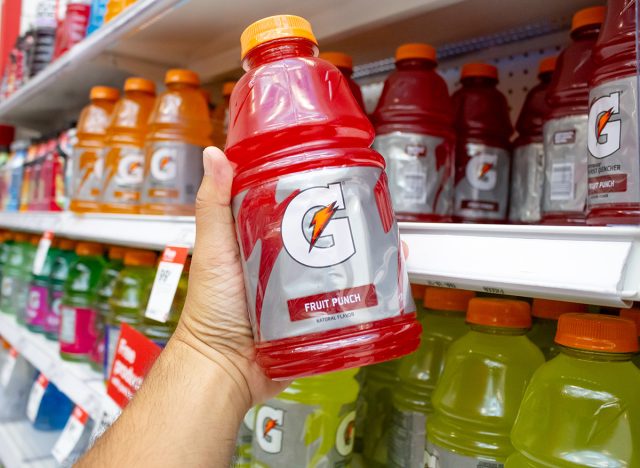
The occasional Gatorade isn't a dealbreaker for health, but it's also not an ideal beverage, due to its sugar content and minimal nutritional value. If you'd like a more nutritious alternative (that still provides plenty of electrolytes), try another option like coconut water, fruit juice, or cow's milk or any of these 10 Best Electrolyte Drinks, According to a Dietitian.
- Source: https://www.accessdata.fda.gov/scripts/cdrh/cfdocs/cfcfr/cfrsearch.cfm?fr=172.735
- Source: https://www.ncbi.nlm.nih.gov/pmc/articles/PMC9052604/
- Source: https://www.mayoclinic.org/diseases-conditions/hyponatremia/symptoms-causes/syc-20373711
- Source: https://www.ncbi.nlm.nih.gov/books/NBK555956/
- Source: https://www.ncbi.nlm.nih.gov/pmc/articles/PMC10054587/
- Source: https://pubmed.ncbi.nlm.nih.gov/33973552/
- Source: https://pubmed.ncbi.nlm.nih.gov/14649371/
- Source: https://fdc.nal.usda.gov/fdc-app.html#/food-details/2678649/nutrients
- Source: https://www.heart.org/en/healthy-living/healthy-eating/eat-smart/sugar/how-much-sugar-is-too-much









